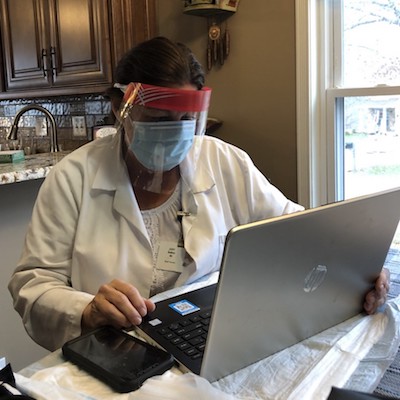Fund Recipient Spotlight: Home Care Nurses Apply Critical Skills in Pandemic
January 13, 2021
 The Front-Line Responders Fund raised over $100,000 to provide financial support to
Webster University students who are working in healthcare on the front lines of the
COVID-19 pandemic while continuing their studies. In this series, student recipients of awards from the fund share their stories of balancing studies,
family, work and more during the pandemic.
The Front-Line Responders Fund raised over $100,000 to provide financial support to
Webster University students who are working in healthcare on the front lines of the
COVID-19 pandemic while continuing their studies. In this series, student recipients of awards from the fund share their stories of balancing studies,
family, work and more during the pandemic.
Spotlight: Judith Ballew
Occupation: Case manager, BJC Home Care
Program: Master of Science in Nursing
“Home care nurses have quietly been on the front line since the beginning of COVID, and I have never missed a day of work since the pandemic began,” said Judith Bellow, a student in Webster University's Master of Science in Nursing program.
“While many offices closed, we go out to homes and become the eyes for the ordering MD or NP,” she said. “In the beginning, we had limited PPE, as the supplies were going to the main hospital. However, we began seeing all patients who did not have COVID but needed care that was no longer available to them because of office closures.”
Education is vital to providing good patient care. It never occurred to me to stop.
“My hours have increased along with the number of referrals for routine care, in addition to COVID patients who have been released from the hospital but are still very ill,” Ballew continued.
The pandemic has had a ripple effect, stressing services and health even for those who have not contracted the coronavirus.
“We also see patients who are infected with COVID but are not ill enough to go to hospital, or those who refuse,” Ballew said. “The fear that many families have and the lack of understanding surrounding the infection make it more difficult for those of us in the field, and the distrust and anger we are subjected to by families at times makes it even harder.”
Despite all of these extra variables, Ballew has continued her studies in the MSN program.
“I have continued my classes while working 50 or more hours a week,” she said. “The hardest part for me was learning to do all my work and research online. Education is vital to providing good patient care. There have been many late nights working through the modules and preparing my assignments. I don't think it ever occurred to me to stop my education.”
The Impact of a Donor-Supported Fund
“Home care nurses can deal with many aspects of care within the home,” Ballew said. “The need for critical thinking and problem solving is essential. Patients depend on the knowledge of the nurses to advocate, teach, and accurately assess them in a non-clinical situation with no other support than a nurse bag and their skills.
“The Front-line Responders Fund award will help me complete my MSN and provide an increased level of care. As our community remains locked down, it is becoming vital to have well educated nurses in the community that can provide direct nursing care in sometimes less than safe or suitable environments.”
